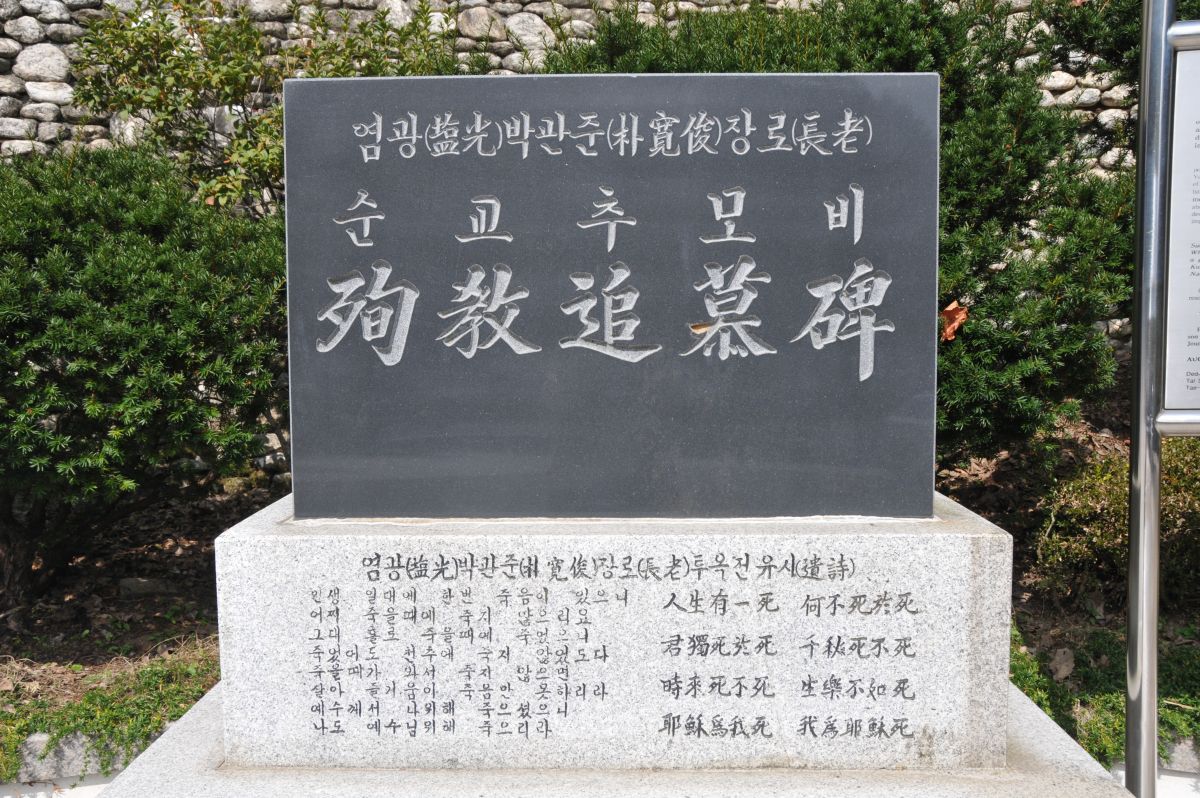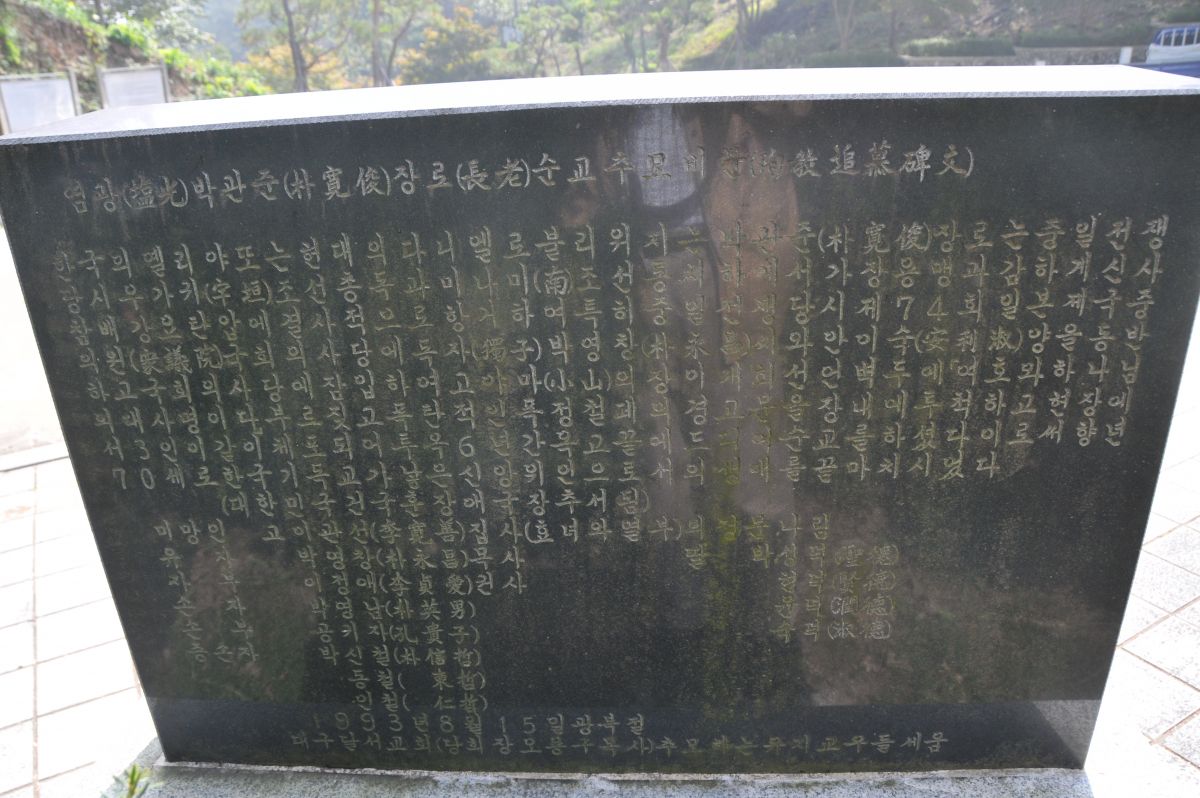- 주소
- 경기도 용인시 처인구 양지면 추계리 산84-1
- 탐방로그
- 염광 박관준 장로 순교추모비는 1993년 8월 15일 건립되었으며 한국기독교순교자기념관에 자리하고 있다.
사적지 사진 상세설명
염광(塩光) 박관준(朴寬俊) 장로(長老) 순교추모비(殉敎追慕碑)
염광(塩光) 박관준(朴寬俊) 장로(長老) 투옥 전 유시(遺詩)
人生有一死 何不死於死(인생 일대에 한번 죽음이 있으니 어찌 죽을 때에 죽지 않으리요.)
君獨死於死 千秋死不死(그대 홀로 죽을 때에 죽었으니 죽었어도 천추에 죽지 않았도다.)
時來死不死 生樂不如死(죽을 때가 와서 죽지 않으면 살아 즐거움이 죽음만 못하리라.)
耶蘇爲莪死 莪爲耶蘇死(예수께서 나 위해 죽으셨으니 나도 예수님 위해 죽으리라.)
이 한시는 1938년 장로회총회가 신사참배를 결의한 직후 박관준 장로가 신사참배 거부항쟁의 신앙동지인 이인재 전도사에게 써주었다고 하는 유시(遺詩)다.
시의 내용을 보면 알 수 있듯이 박관준 장로는 이때 이미 순교를 결심하였던 것이다.
염광(塩光) 박관준(朴寬俊) 장로(長老) 투옥 전 유시(遺詩)
人生有一死 何不死於死(인생 일대에 한번 죽음이 있으니 어찌 죽을 때에 죽지 않으리요.)
君獨死於死 千秋死不死(그대 홀로 죽을 때에 죽었으니 죽었어도 천추에 죽지 않았도다.)
時來死不死 生樂不如死(죽을 때가 와서 죽지 않으면 살아 즐거움이 죽음만 못하리라.)
耶蘇爲莪死 莪爲耶蘇死(예수께서 나 위해 죽으셨으니 나도 예수님 위해 죽으리라.)
이 한시는 1938년 장로회총회가 신사참배를 결의한 직후 박관준 장로가 신사참배 거부항쟁의 신앙동지인 이인재 전도사에게 써주었다고 하는 유시(遺詩)다.
시의 내용을 보면 알 수 있듯이 박관준 장로는 이때 이미 순교를 결심하였던 것이다.
염광(塩光) 박관준(朴寬俊) 장로(長老) 순교추모비문(殉敎追慕碑文)
한국의 델리야 도는 현대의 다니엘로 불리워지는 박관준(朴寬俊) 장로는 중일전쟁 당시 우가귀(宇垣:우원) 조선총독과 미나미(南:남) 조선통치하에서 가장 용맹 과감하게 신사참배 강요탄압에 결사적으로 항거하여 특히 중일전쟁 당시 제74회 일본제국 중의원(衆議院) 국회의사당에 독자(獨子) 박영창(朴永昌)씨와 안이숙(安利淑)양을 동반하고 국회의사당에 잠입하여 고야마(小山:소산)의장이 개회선언 벽두에 「여호와 하나님의 대사명이다」 부르짖고 폭탄적인 폭정 철폐의 경고문을 장내에 투척하고 현장에서 3인이 같이 체포되어 투옥 6년간 옥고 끝에 드디어 순교를 하셨다. 이로써 향년 70세로 한국기독교가 낳은 신앙 위인으로서의 생애를 끝마치시었다. (대한민국 건국훈장 애국장 추서됨)
미망인 고 이관선(李寬善) 집사(효녀와 열부)의 정문. 나림
유자 박영창(朴永昌) 목사, 딸 박성덕(聖德), 현덕(賢德), 윤덕(潤德), 숙덕(淑德)
자부 이정애(李貞愛) 권사, 손자 박영남(朴英男), 손부 공귀자(孔貴子), 증손자 박신철(朴信哲) 동철(東哲), 인천(仁哲)
1993년 8월 15일 광복절 대구달서교회(당회 장오용 구목사) 추모하는 유지 교우들 세움
한국의 델리야 도는 현대의 다니엘로 불리워지는 박관준(朴寬俊) 장로는 중일전쟁 당시 우가귀(宇垣:우원) 조선총독과 미나미(南:남) 조선통치하에서 가장 용맹 과감하게 신사참배 강요탄압에 결사적으로 항거하여 특히 중일전쟁 당시 제74회 일본제국 중의원(衆議院) 국회의사당에 독자(獨子) 박영창(朴永昌)씨와 안이숙(安利淑)양을 동반하고 국회의사당에 잠입하여 고야마(小山:소산)의장이 개회선언 벽두에 「여호와 하나님의 대사명이다」 부르짖고 폭탄적인 폭정 철폐의 경고문을 장내에 투척하고 현장에서 3인이 같이 체포되어 투옥 6년간 옥고 끝에 드디어 순교를 하셨다. 이로써 향년 70세로 한국기독교가 낳은 신앙 위인으로서의 생애를 끝마치시었다. (대한민국 건국훈장 애국장 추서됨)
미망인 고 이관선(李寬善) 집사(효녀와 열부)의 정문. 나림
유자 박영창(朴永昌) 목사, 딸 박성덕(聖德), 현덕(賢德), 윤덕(潤德), 숙덕(淑德)
자부 이정애(李貞愛) 권사, 손자 박영남(朴英男), 손부 공귀자(孔貴子), 증손자 박신철(朴信哲) 동철(東哲), 인천(仁哲)
1993년 8월 15일 광복절 대구달서교회(당회 장오용 구목사) 추모하는 유지 교우들 세움
박관준장로(1875-1945.3.13) 장로이며 의사이셨고 1941년 일본천황의 반역죄와 신사참배반대로 투옥되어 1945년 3월 13일 순교하였다.
MONUMENT
(IN MEMORY OF THE MARTYRDOM OF ELDER KWAN-JOON PARK)
The late Kwan-Joon Park, who is called an Elijah of Korea or a Daniel of modern times, had fought and died as a martyr for his faith in Christ and for the love of his country, Korea, opposing the Japanese colonial rule during the Second World War, when Korea was occupied by the Japanese imperialists.
On Mar. 24, 1939, the elder Park went to Japan to protest against inhuman colonial policies of Japan. He walked into the 74th Imperial Diet of Japan with his only son, Young-Chang Park, and their friend, Miss Ei-Sook Ahn. When the opening pronouncement of the Lower House of Japanese Diet was made, he stood up from his seat in the visitors' balcony and shouted as planned: "This is a great mission of God, Jehovah's great message!" Then he threw anti-Japanese leaflets to the floor of the Diet, exposing cruel abuse of Korean Christians by Japan and warning them of God's imminent judgement and destruction of Japan as a result of her wrong doing and tyranny, resisting Japanese imposition of Shinto Shrine worship upon Korean Christians.
Elder Park, along with his son and their friend, was arrested on the scene. Subsequently, he was sentenced to six years and imprisoned by Japanese authority. While serving in prison, he was martyred at the age of seventy, ending his life as a great man of faith in the glorious history of Korean Church Afterwards, elder Kwan Joon Park was honoured with the Order of Patriotic Service, the Merit of National Foundation, the Republic of Korea.
One line from his last poem written during his imprisonment expresses well his firm resolution to die willingly for Jesus Christ.
"Since Jesus died for me, I will die for Jesus."
He was survived by his wife Kwan-Sun Lee who was a devoted deaconess, his son Young-Chang Park who later became a Christian minister, his daughter-in-law Joung-Ae Lee, a devout Christian woman.
AUGUST 15, 1993
Dedicated by Pastor Yong-Ku Oh and Fellow Laymen
Tal Seo Church
Tae-ku, Korea
(IN MEMORY OF THE MARTYRDOM OF ELDER KWAN-JOON PARK)
The late Kwan-Joon Park, who is called an Elijah of Korea or a Daniel of modern times, had fought and died as a martyr for his faith in Christ and for the love of his country, Korea, opposing the Japanese colonial rule during the Second World War, when Korea was occupied by the Japanese imperialists.
On Mar. 24, 1939, the elder Park went to Japan to protest against inhuman colonial policies of Japan. He walked into the 74th Imperial Diet of Japan with his only son, Young-Chang Park, and their friend, Miss Ei-Sook Ahn. When the opening pronouncement of the Lower House of Japanese Diet was made, he stood up from his seat in the visitors' balcony and shouted as planned: "This is a great mission of God, Jehovah's great message!" Then he threw anti-Japanese leaflets to the floor of the Diet, exposing cruel abuse of Korean Christians by Japan and warning them of God's imminent judgement and destruction of Japan as a result of her wrong doing and tyranny, resisting Japanese imposition of Shinto Shrine worship upon Korean Christians.
Elder Park, along with his son and their friend, was arrested on the scene. Subsequently, he was sentenced to six years and imprisoned by Japanese authority. While serving in prison, he was martyred at the age of seventy, ending his life as a great man of faith in the glorious history of Korean Church Afterwards, elder Kwan Joon Park was honoured with the Order of Patriotic Service, the Merit of National Foundation, the Republic of Korea.
One line from his last poem written during his imprisonment expresses well his firm resolution to die willingly for Jesus Christ.
"Since Jesus died for me, I will die for Jesus."
He was survived by his wife Kwan-Sun Lee who was a devoted deaconess, his son Young-Chang Park who later became a Christian minister, his daughter-in-law Joung-Ae Lee, a devout Christian woman.
AUGUST 15, 1993
Dedicated by Pastor Yong-Ku Oh and Fellow Laymen
Tal Seo Church
Tae-ku, Korea





